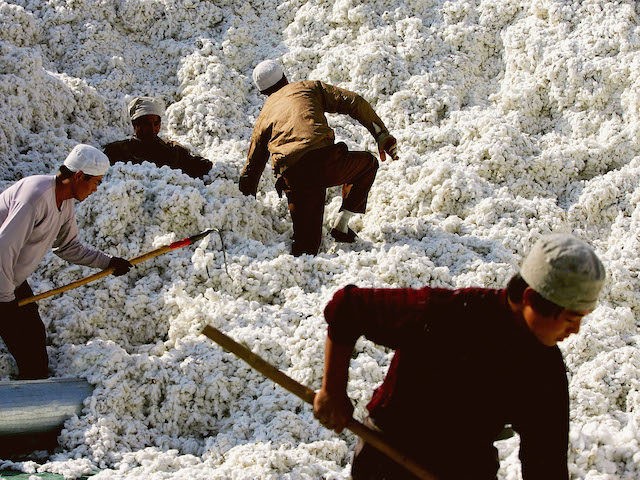Chinese cotton industry groups launched a campaign Thursday to “build a homegrown independent sustainable standard and certification system” to shirk condemnation from the systems that exist internationally in response to evidence of widespread use of slave labor to pick cotton in China.
China’s Global Times, a state-run propaganda newspaper, claimed on Friday that mounting calls for banning the export of cotton out of Xinjiang, China’s largest and westernmost region, had actually increased Xinjiang cotton’s popularity among Chinese citizens and domestic clothing companies.
Xinjiang is home to the majority of China’s ethnic Uyghur population, a Muslim-majority group that has endured decades of persecution from the Communist Party. Scholars and human rights researchers have compiled ample evidence that, in 2017, the regime of dictator Xi Jinping began erecting concentration camps for Uyghurs and other Muslim people in the Xinjiang region. By 2019, the U.S. government estimated as many as 3 million people had passed through the concentration camps, enduring communist indoctrination, torture, rape, forced sterilization, and testing congruent with live organ harvesting.
The next year, the Australian Strategic Policy Institute (ASPI) published its landmark report “Uyghurs for Sale,” accusing 83 international corporations of working with Chinese factories that had purchased Uyghur slave labor out of the concentration camps. The report raised particular alarm because the slave labor was occurring outside of Xinjiang – the Chinese Communist Party was reportedly selling slaves online and bussing them to factories nationwide, allowing the international companies to state truthfully that they were not operating in Xinjiang while benefiting from human rights abuses there.
Subsequent reports found similar abuses of Uyghurs in Xinjiang’s cotton fields. Xinjiang is responsible for 84 percent of the cotton produced in China, which is in turn represents about 20 percent of all cotton produced in the world. Among the most concerning revelations by researchers in the region was the open use of mobile applications to make it easier for cotton farm owners and administrators to purchase Uyghur slaves online.
Chinese officials have defended the concentration camps as “vocational training” centers for uneducated people – a claim refuted by a long list of individuals with advanced degrees who have disappeared into the camps – and branded its slave trade a program for “facilitation of labor” for those who would otherwise struggle to find jobs.
The international community has largely rejected China’s defenses. The Better Cotton Initiative (BCI), an international non-profit that aids companies in avoiding slavery-tainted cotton, suspended licenses for Chinese companies operating in Xinjiang last year, according to the Global Times. U.S. Customs and Border Patrol (CBP) have also amplified efforts to intercept slavery-tainted products from China, attempting to fully close the American market to the practice.
Beijing’s response, according to the state propaganda outlet, is the “Cotton China Sustainable Development Program.”
“The move marks a milestone in overhauling the global cotton rule-making system, which is currently monopolized by the Better Cotton Initiative (BCI),” the Global Times claimed, “a West-led industry body that has apparently been manipulated by some anti-China forces in their slandering against China and its policies in Northwest China’s Xinjiang Uygur Autonomous Region.”
Unnamed “industry insiders” told the state newspaper that the program would “make China – the world’s largest cotton consumer market – hold a significant saying [sic] in international pricing and standard-setting, and more importantly, lend it a tool to reasonably defend itself and protect its legitimate interests against Western political crackdowns.” Its “ultimate goal,” it continued, was the reduction of “reliance on Western standards.”
Alongside the launch of the campaign, China’s Southwest University of Political Science and Law (SWUPL) published what it claimed to be an “extensive” investigation into evidence of slavery in the Xinjiang cotton issue, which conveniently absolved the industry of all accusations against it. The study noted that Xinjiang had “mechanized” so much of the cotton-picking done in the region that the demand for human labor was low.
“The research shows that cotton production in southern Xinjiang has achieved large-scale mechanization through high-standard farmland construction, land transfer and national agricultural machinery subsidies,” the People’s Daily, the official newspaper of the Chinese Communist Party, reported. “Compared with other occupations, the high income of cotton-picking makes it a very attractive job. The right of cotton pickers like remuneration for labor, occupational safety and health are also guaranteed.”
On Friday, the Global Times declared that, alongside Chinese regime efforts to legitimize Chinese slave cotton internationally, Xinjiang cotton was “gaining vogue among Chinese consumers,” partly as a “patriotic” reaction to global disgust.
“The sales jump at home market, which has boosted Xinjiang manufacturers’ businesses, comes amid an across-the-board industrial effort to build the high-quality Xinjiang cotton into a global brand,” the propaganda outlet asserted.
A Xinjiang textile manufacturer told the outlet that public outrage against slavery practices in China “generated a tsunami of anger among Chinese public [sic]” that has buoyed the industry, claiming a “shopping spree when it comes to Xinjiang cotton in the past months, from T-shirt, pajamas, bags to tissues, which largely boosts his business.”

COMMENTS
Please let us know if you're having issues with commenting.